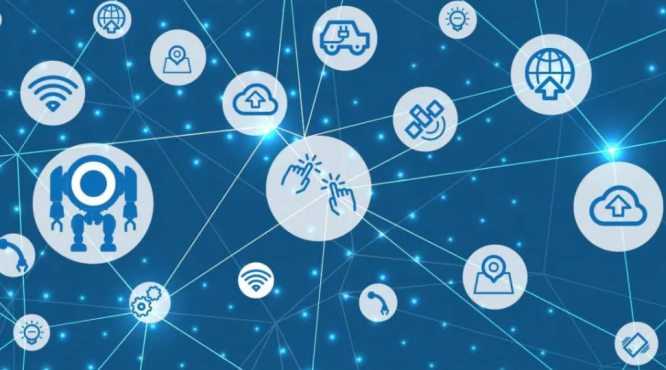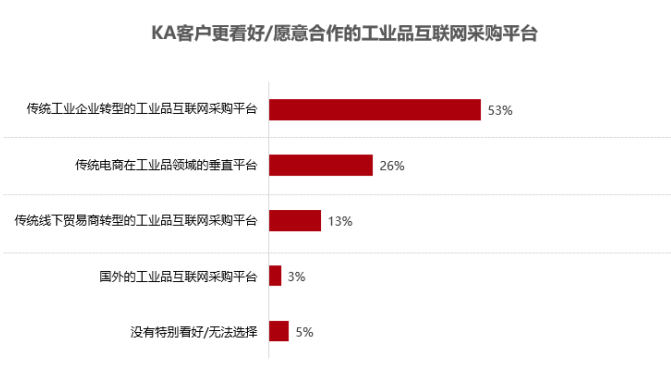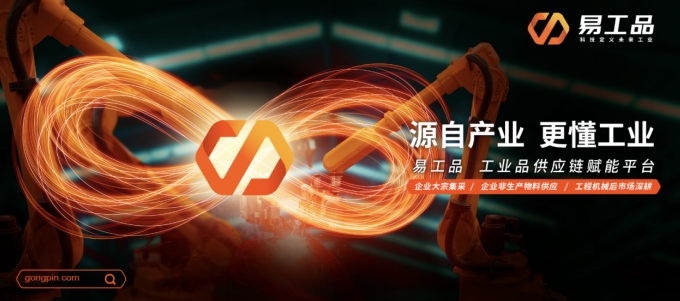In recent years, the policy level has continued to standardize the industrial Internet and industrial product B2B platforms. The superimposed new crown pneumonia epidemic is increasingly dependent on online development. As more and more B2B platforms for industrial products based on different development backgrounds emerge one after another, this industry is ushering in an era of blooming flowers.
According to McKinsey's research data, digital transformation of companies can increase their profit margins by 9-14 percentage points; while digital procurement and supply chain will bring about 1.3-2.5 percentage points increase in profits for companies, which is exactly equal to the gross profit level of industrial B2B companies .
But at the same time, industrial products are different from traditional consumer products. Buyers have clearer requirements for product stability, category diversity, and service continuity. Therefore, different types of platforms have their own requirements in this process. There are different competitive advantages.
Then, in the context of this industrial product B2B platform, who has the better development potential? In the final analysis, which type of platform can be closer to the core pain points of enterprise-side customers, and can truly develop and grow in the domestic industrial ecology.
The heroes compete for the trillion-level market
In recent years, policy support and guidance have been strengthened, which to a certain extent has promoted the development of B2B procurement platforms for industrial products.
Since 2015, the Industrial Internet has officially become the development direction advocated at the national level. Over the following years, relevant ministries and commissions have successively promoted the better advancement of industrial Internet industry standards and popularization.
In 2016, the State Council issued the "Guiding Opinions on Deepening the Integrated Development of Manufacturing and the Internet" to lay a policy foundation for strengthening the application of the B2B platform for industrial products. In the following years, relevant policies have provided guidance in specific areas such as cultivating a personalized customization model for e-commerce, expanding the scale of industrial APP application, and promoting the market for production materials and enterprises to develop supply and demand docking.
Subsequently, in April 2020, the National Development and Reform Commission and the Central Cyberspace Administration of China jointly issued the "Implementation Plan on Promoting the "Use of Data and Intelligence on Clouds" to Cultivate New Economic Development" to encourage the formation of a multi-layered industrial Internet platform and establish cross-industry integration. The digital ecology of the industry provides policy support for the industrial B2B platform to promote the optimization strategy of the upstream and downstream industrial chain structure.
Over the years of policy promotion and the gradual acceptance and maturity of the industrial ecology, the B2B platform has begun to play an important role in this huge industry.
According to iResearch, the B2B online penetration rate of industrial products in 2020 is 4.5%, and it is expected to reach 13.2% by 2025; in 2020, the scale of China's industrial products market will be 10.6 trillion yuan, and the overall domestic economy will improve as the epidemic eases , The real economy continues to develop, and the industrial product market is expected to reach 13.2 trillion yuan in 2025, with a compound annual growth rate of 4.5%. The increase in the penetration rate of the industrial B2B e-commerce platform will drive the rapid growth of the market. It is estimated that the compound annual growth rate of the industrial B2B e-commerce market in the next five years will be 30%, reaching 1.75 trillion yuan by 2025.

A number of B2B procurement platforms for industrial products based on different historical backgrounds have gradually emerged. In the course of their development, the different backgrounds and development trajectories of these platforms also make them different from each other.
The first category of industrial product Internet procurement platform for the transformation of traditional industrial enterprises, such as Yigongpin. Compared with other camps, based on historical development and accumulation, this type of platform has a deep understanding of the industrial industry and can understand the needs of B-end customers; at the same time, it has a wealth of supplier resources, allowing this type of platform to control the cost and quality of goods strict. Of course, the relative weakness is that they may face short-term problems of insufficient network traffic, and they have a relatively better understanding of products in their field, so there will be certain barriers to cross-industry development.
The second category is the vertical platform of traditional e-commerce in the field of industrial products, such as 1688 industrial products and JD industrial products. This type of platform has a relatively deep accumulation of network technology and platform operation capabilities in history, so the network traffic is also large, but the problem may be mainly due to insufficient accumulation of the industrial industry itself, so the familiarity of related products will be It must be constrained.
The third category is the industrial product Internet procurement platform transformed by traditional offline traders, such as Xinfangsheng. The same as the original accumulation in the industrial field, the products of this type of platform are highly specialized, and they are relatively familiar with the commodity parameters required by B-end customers, but the weakness lies in the long-term focus on offline platforms and the transformation of online and traditional traders. Identity makes it relatively more focused on price, or it may cause uneven performance of product quality.
The fourth category is foreign industrial product Internet procurement platforms, such as Misumi and Gu'anjie. Foreign platforms have a relatively good understanding of the industry and also focus on professional services, but their weakness is that they are not familiar with the relevant domestic industrial ecology, and are no better than domestic local manufacturers in terms of resource links and cost control. Advantage.
According to statistics from organizations, the attitudes of important major customers towards various industrial product procurement platforms show that 53% of major customers prefer industrial product procurement platforms with traditional industrial enterprise backgrounds, and the trusted platform is purely e-commerce background. And cut into the vertical platform of the industrial product field.

Sniper the pain points, get the world
There are inevitable reasons for the preference of important customers. In the decision-making process of industrial industry ecological companies, they often focus on several major factors: the stability of upstream products will better ensure that the company’s own operations will not easily face the risk of stagnation; the digital capabilities of the B2B platform will be better than those of the B-end enterprise. The full link resource docking is more coordinated and consistent; equally important is that the requirements for product quality need to be matched with the same powerful service capabilities that cover the front, middle and back ends of the sales link.
Soochow Securities analysis pointed out that unlike the C-end mass users, the needs of industrial customers are more clear. They know what they need, so potential customers have a clear group; in addition, these customers do not need products that are not related to their own business. Although the number of SKUs on the e-commerce platform is large, it does not seek "general but scattered" but "complete but specialized". Since the procurement link can be directly marketed to the normal operation of the company, they value "stability", that is, the stability of product supply and quality.
The agency continued that it can roughly summarize four elements: sufficient industrial resources; early entry time and large scale; moderate concentration and full competition in the upstream of the industry, and relatively decentralized downstream; sufficient funds and a stable business environment. Enterprises that meet these four conditions at the same time are more likely to obtain stable and sustainable development; and if one of the four conditions goes wrong, the development of the enterprise may be more or less hindered.
In contrast, the aforementioned first and second types of platforms will have a better reserve of advantages and capabilities in related fields, and they cannot understand why they are more valued by customers. In contrast, the first type of platform is an extension of the industrial industry's own development, and will have more service advantages for professionalism, industrial field and customer understanding.
A typical example is the Yigong product platform, which has long-term accumulation and accumulation, whether it is the source of employees, the historical polishing of the supply chain matching in the subdivisions, the resource connection to the external industrial ecology, and the development of platform data and intelligence. .
It is reported that in terms of personnel matching, the current team of Yigongpin has reached a scale of 1,000 people. The team members are mainly from the industrial and Internet industries, and most of them are first-line manufacturers in various vertical fields. This part accounts for more than 70% of the total team members. Among them, the 100-person selection expert team has more than 10 years of industry experience per capita, and has a wealth of user service experience.

Due to its development history, it has maintained cooperation and symbiosis with construction machinery giants such as Sany Group, or industry leaders in other industrial subdivisions throughout the year. In this process, its supply chain docking breadth and docking efficiency have been repeatedly verified. .
Based on the previous accumulation of potential energy with leading companies, in terms of external connections, it is reported that Yigongpin has built its own ecological alliance. In response to business or production pain points, the members of the alliance jointly communicate technology, resources, channels, and talents, and the demand side and the supply side directly connect and cooperate, which can realize the efficient use and integration of resources.
More important is the verification of its own digital capabilities. Yigongpin has already carried out in-depth cooperation with Root Internet, which is dedicated to building an industrial Internet operating system, to achieve all-round full-link management from procurement data to production data. It is understood that through this kind of cooperation, Yigongpin can grasp and predict the current production situation and production capacity of upstream cooperative enterprises in real time, and efficiently match the data with downstream demand enterprises based on data, so as to achieve more accurate and rapid resource scheduling between enterprises.
As a result, changes in the overall procurement requirements of the industrial zone where the specific partner is located, to the current utilization rate of a specific piece of construction site equipment and overall working hours can be presented in the system in a data-based form, ultimately forming effective information to support analysis And decision-making.
In the current industrial industry that is in urgent need of digitalization and even intelligence, the outstanding advantages of resource aggregation, rapid demand matching, and data platformization support the rapid development of B2B platform types based on the transformation of traditional industrial enterprises. In the process of competition and cooperation of this trillion-level industrial product procurement platform, such platforms have more mature capabilities to support the development and iteration of industrial enterprises, and thus have more development advantages.
In the current market environment, although the industrial product B2B platform has undergone long-term intensive cultivation of the above four camps, the overall digital penetration rate still needs to be improved. The major camps are also constantly making up for their shortcomings, trying to become one of the few market giants in the market. Although the B2B platform transformed by traditional industrial enterprises has natural user trust and industry heritage, it also needs to innovate and focus on user services in order to maintain current high growth.
















 RCCN WeChat QrCode
RCCN WeChat QrCode Mobile WebSite
Mobile WebSite